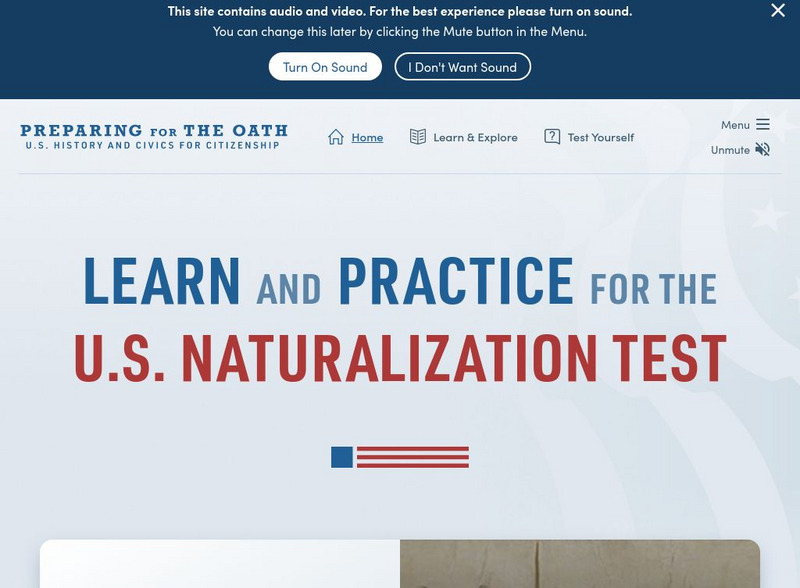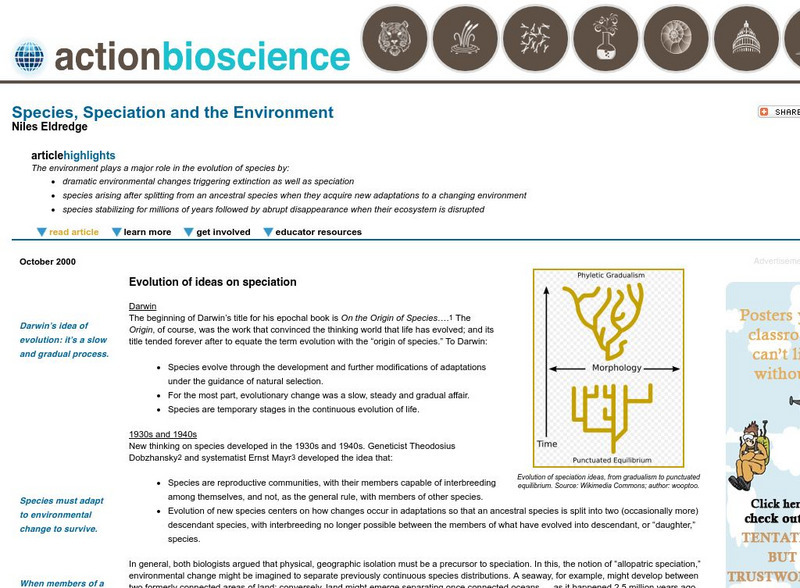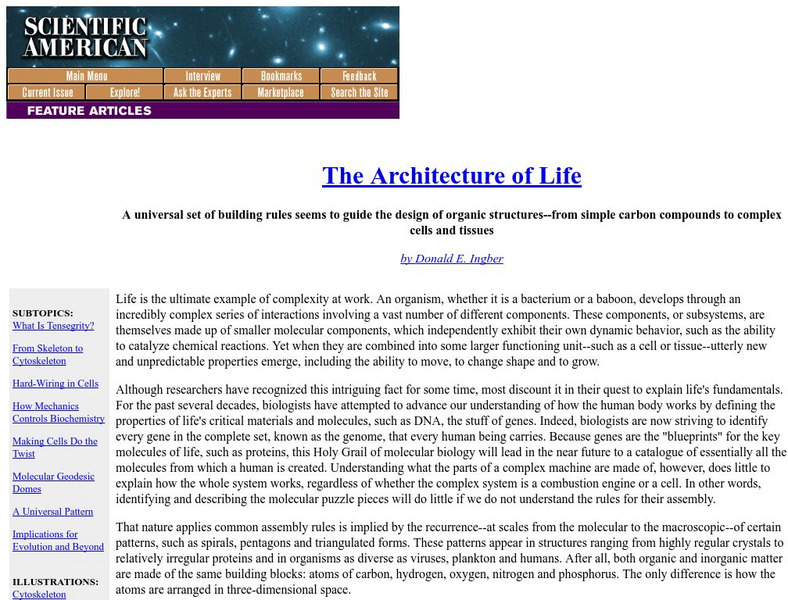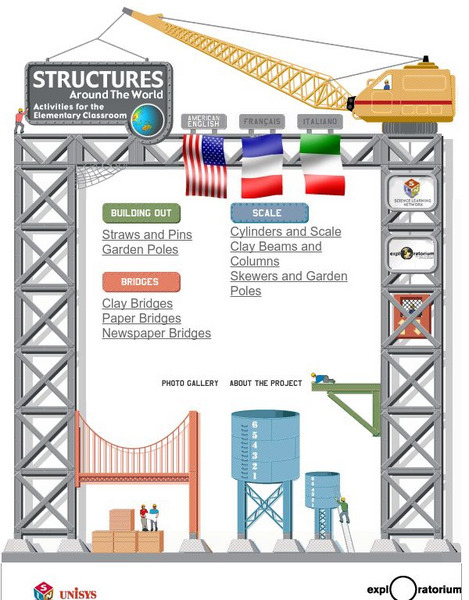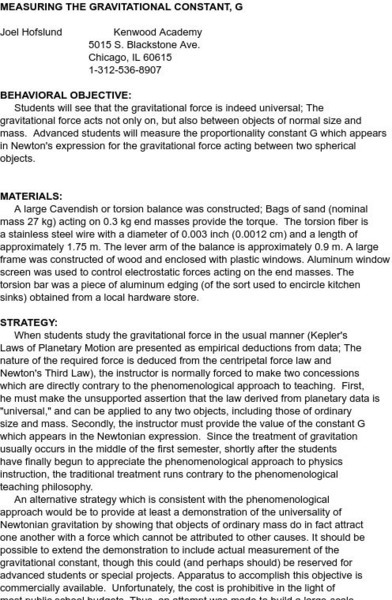Hi, what do you want to do?
Curated OER
Ecological Relationships
Students identify ecological elements and their factors on species, populations and food webs. They analyze ecosystems for these elements and research how these factors influence species survival rate. Predictions on conditions over time...
Curated OER
Government Lesson Plan: Lesson Plan 6
Young scholars examine legislation on immigration policies. They discuss current immigration laws, read a handout, complete a chart, and answer discussion questions.
Curated OER
Testing Termites to Discover
Students design an experiment to discover how termites respond to their environment.
Curated OER
Tour + Workshop = DESIGN: Presenting Information
Students develop a business card to market them. For this developing a business card to market them lesson, students design a business card to represent them. Students create a logo or graphic design that is professional and...
Curated OER
Clay Sculpture: Relationships
Students explore art history by conducting an in-class activity. For this sculpting lesson, students examine previously created art sculptures in a textbook. Students utilize clay, sculpting tools and grey paper to create their own...
Other
World Justice Project: What Is the Rule of Law?
Derived from internationally accepted standards, the World Justice Project's definition of the rule of law is a system in which the following four universal principles are upheld by four universal principles. These four universal...
American Museum of Natural History
American Museum of Natural History: Water: H2 O = Life
This exhibition illuminates the concept of ecological balance and the challenge of managing the Earth's water supply. Its videos and images help explain just how important water is to sustaining life.
Nature Research
Nature Education: Energy Economics in Ecosystems
This article discusses how plants and microorganisms, until recently, have mostly controlled how much carbon dioxide is released into an ecosystem, and explains how this process works. Humans' burning of fossil fuels has upset the...
PBS
Pbs Teachers:denali: The Wolf and the Moose: Predator and Prey Relationships
Examine the predator/prey relationship between wolves and moose in Alaska's Denali National Park and discuss how the balance of nature works between these two animals.
PBS
Pbs Teachers:mammals of Namib: Who's in Charge?
Identify mammals of the Namib Desert, categorize which are predators and which are prey and discuss the balance of nature in Namib.
Smithsonian Institution
National Museum of American History: Preparing for the Oath: u.s. History and Civics for Citizenship
This site from the National Museum of American History, part of the Smithsonian Institution, is a great site for citizens and those learning to become citizens alike. Review the fifteen themes that deal with U.S. history and civics,...
American Institute of Biological Sciences
Action Bioscience: Species, Speciation and the Environment
The American Institute of Biological Sciences offers this article by Niles Eldredge, evolutionary theorist and curator at the American Museum of Natural History. Eldredge begins with Darwin's theories and summarizes subsequent thought,...
University of California
Organic Structures:the Architecture of Life
Article discusses how objects in nature are held together through balanced forces. Scroll midway down to find info on microtubules and microfilaments. Links to excellent electron micrographs.
PBS
Pbs: Nature: Hawaii's Vulnerable Biodiversity
Because of Hawaii's isolation, endemic species evolved in their own unique way. With the arrival of foreigners and colonization, new species were introduced to the islands. The result being a crisis within the Hawaiian ecosystem,...
Cornell University
Cornell University: Art, Design, and Visual Thinking
Use the left-hand toolbar of this site to investigate an online textbook for the language of design. It provides visual examples and explanations of line, form, color, color psychology, texture, balance, proportion and many more...
PBS
Pbs Teachers: Rivers of Destiny
This site explains the importance of rivers in the natural balance of life on Earth, and describes what happens when people begin to tamper with rivers. This will also help students identify options for dealing with the outcomes of human...
Brigham Young University
World War I Document Archive: On the Nature of War, by Helmut Moltke (The Elder)
The text of a letter from Count Helmuth von Moltke, Chief of the General Staff of the German army, in 1880, to Johann Kaspar Bluntschli, an international law expert. Moltke wrote the letter in response to examining a handbook on war...
National Geographic
National Geographic: Ecosystem Imbalance in the World
In this lesson, students build on their knowledge of individual impacts on the ocean to see how the whole system can react to threats and changes. They examine ways in which human actions throw marine ecosystems out of balance, explore...
CPALMS
Florida State University Cpalms: Florida Students: Enlightenment Ideas and the Founding Fathers
A tutorial that looks at the ideas from the Enlightenment that influenced the Founding Fathers, particularly those of John Locke and Montesquieu. A PDF file of the tutorial is available.
University of Groningen
American History: Outlines: Human Nature, Government and Individual Rights
Overview discussion of the views held by Madison and Hamilton that people, in general, need to have written into the law certain checks and balances to guard against abuse of power, protect individual rights and encompass a pluralistic...
TeachEngineering
Teach Engineering: Engineers Speak for the Trees
Students begin by reading Dr. Seuss' "The Lorax" as an example of how overdevelopment can cause long-lasting environmental destruction. Students discuss how to balance the needs of the environment with the needs of human industry....
Exploratorium
Exploratorium: Structures Around the World
How does that bridge stay up? What are the forces acting on that column? This site helps students understand how structures can be built by having them build their own. Also provides images of real structures for kids to compare with...
Science and Mathematics Initiative for Learning Enhancement (SMILE)
Smile: Measuring the Gravitational Constant, G
A demonstration/lab idea for determining the numerical value of the universal gravitation constant using a torsion balance.
PBS
Pbs Teachers: Predator Protector Game Lesson
Describe the habitat, food web and ecosystem of shark species. Identify threats to sharks and explore how top predators help to maintain the balance of nature within ecosystems. This lesson plan also contains an interactive game.















